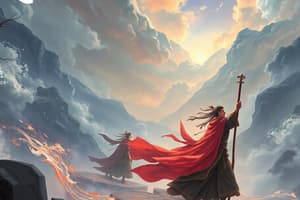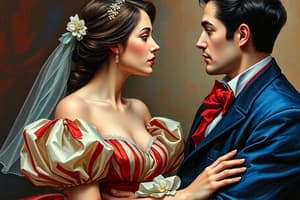Podcast
Questions and Answers
What is the definition of literature?
What is the definition of literature?
Fiction that consists of words that can stir our imagination.
What is the synonym for the novel?
What is the synonym for the novel?
- protagonist
- antagonist
- motif
- fiction (correct)
What is a protagonist?
What is a protagonist?
A central character that piques our interest.
Which of these is NOT a trait of popular fiction?:
Which of these is NOT a trait of popular fiction?:
What is the key element of a romance formula?
What is the key element of a romance formula?
Which of these is NOT a typical characteristic of a romance heroine?
Which of these is NOT a typical characteristic of a romance heroine?
What is the purpose of secondary characters in a romance formula?
What is the purpose of secondary characters in a romance formula?
What does a theme refer to in a story?
What does a theme refer to in a story?
A story's theme is the same as its subject.
A story's theme is the same as its subject.
What is a motif?
What is a motif?
What is the definition of plot?
What is the definition of plot?
Which of these is NOT a type of plot structure?
Which of these is NOT a type of plot structure?
What is suspense in the context of plot elements?
What is suspense in the context of plot elements?
What is foreshadowing in the context of plot elements?
What is foreshadowing in the context of plot elements?
What's the first stage in a standard plot sequence?
What's the first stage in a standard plot sequence?
What's the second stage in a standard plot sequence?
What's the second stage in a standard plot sequence?
What is point of view in storytelling?
What is point of view in storytelling?
A 3rd person limited point of view can be omniscient.
A 3rd person limited point of view can be omniscient.
What is style in storytelling?
What is style in storytelling?
Which of these is NOT a classification of style based on literary periods or traditions?
Which of these is NOT a classification of style based on literary periods or traditions?
What's the definition of irony?
What's the definition of irony?
Which type of irony involves a person saying one thing but meaning the opposite?
Which type of irony involves a person saying one thing but meaning the opposite?
What is a symbol?
What is a symbol?
Which of these is NOT a category for symbols?
Which of these is NOT a category for symbols?
What's the definition of a literary symbol?
What's the definition of a literary symbol?
What is the definition of allegory?
What is the definition of allegory?
What are formalist reading strategies?
What are formalist reading strategies?
What are biographical reading strategies?
What are biographical reading strategies?
What are psychological reading strategies?
What are psychological reading strategies?
What are historical reading strategies?
What are historical reading strategies?
What are gender reading strategies?
What are gender reading strategies?
What are reader-response reading strategies?
What are reader-response reading strategies?
What are deconstructionist reading strategies?
What are deconstructionist reading strategies?
Which of these is NOT a work mentioned in the provided content?
Which of these is NOT a work mentioned in the provided content?
Flashcards
Fiction
Fiction
Literary narratives, often in prose, that are not based on factual events.
Protagonist
Protagonist
The main character in a story, often the one we focus on.
Antagonist
Antagonist
A character or force that opposes the protagonist.
Popular Fiction
Popular Fiction
Signup and view all the flashcards
Romance Formula
Romance Formula
Signup and view all the flashcards
Theme
Theme
Signup and view all the flashcards
Motif
Motif
Signup and view all the flashcards
Plot
Plot
Signup and view all the flashcards
Point of View
Point of View
Signup and view all the flashcards
3rd Person Omniscient
3rd Person Omniscient
Signup and view all the flashcards
3rd Person Limited
3rd Person Limited
Signup and view all the flashcards
1st Person
1st Person
Signup and view all the flashcards
Style
Style
Signup and view all the flashcards
Tone
Tone
Signup and view all the flashcards
Irony
Irony
Signup and view all the flashcards
Verbal Irony
Verbal Irony
Signup and view all the flashcards
Sarcasm
Sarcasm
Signup and view all the flashcards
Symbol
Symbol
Signup and view all the flashcards
Formalist Reading
Formalist Reading
Signup and view all the flashcards
Biographical Reading
Biographical Reading
Signup and view all the flashcards
Psychological Reading
Psychological Reading
Signup and view all the flashcards
Exposition
Exposition
Signup and view all the flashcards
Rising Action
Rising Action
Signup and view all the flashcards
Climax
Climax
Signup and view all the flashcards
Resolution
Resolution
Signup and view all the flashcards
Study Notes
Literature - Fiction
- Literature consists of words that stir imagination
- Fiction is a synonym for a novel
- Protagonist: The central character that attracts interest
- Antagonist: Character who opposes the protagonist
Popular Fiction
- Types: Adventure, Western, Horror, Romance
- Traits: Happy endings, momentary relief from daily problems, often marketed for sale
Romance Formula
- Plot: A love relationship between a hero and heroine develops with several complications
- Heroine: Young woman, often vulnerable and attractive
- Hero: Older, handsome, successful man
- Secondary characters: Help advance the plot (other men/women)
- Setting: Exciting and contemporary
- Love Scenes: Should appeal to senses but avoid graphic descriptions
- Genres: Classic, contemporary, historical, young adult, fantasy
Theme
- Central idea of a story, distinct from the subject
- Example: Battle Royal by Ralph Ellison
Motif
- Recurrent poetic concepts or formulas
- Example: Carpe Diem in "To the Virgins, to Make Much of Time" by Robert Herrick
Plot
- Author's arrangement of events in the story
- Types: Chronological, back and forth, beginning at the end, in medias res, flashback
- Elements: Suspense, surprise, unity of action, foreshadowing
- Standard Plot Sequence: Exposition, Rising action, conflict, climax, resolution
Point of View
- Narrator's perspective in a story
- 3rd person: Narrator outside the story, refers to characters by name or pronouns
- Omniscient: Knows everything about the characters
- Limited: Knows things about one or a few
- 1st person: Narrator is a character, experiences are limited to their scope
- 2nd person: Narrator addresses the reader using "you"
Style
- How speakers or writers express themselves (e.g., pure, ornate, sober, simple)
- Classification: Various systems based on literary period, influential texts, individual authors, or institutional use
Tone
- Author's attitude towards people, places, and events in a story
Irony
- Reveals reality that differs from what appears to be true
- Types: Verbal, Situational, Dramatic, Cosmic
Symbol
- Object, person, or event with deeper meaning beyond a literal interpretation
- Conventional/Public symbols (e.g., Cross in Christianity)
Formalist Reading Strategies
- Focuses on internal aspects of a literary work (e.g., irony, narration)
- Might include external elements (e.g., history, biography)
Biographical Reading Strategies
- Examines an author's life to gain better understanding of their work
Psychological Reading Strategies
- Applies psychological theories (e.g., Freud) to analyze texts, considering the unconscious, desires, and different aspects of the psyche (id, ego, superego)
Historical Reading Strategies
- Analyzes texts within the historical context in which they were created, considering cultural, political, and economic factors
Gender Reading Strategies
- Examines how gender impacts a literary work
- Types: Feminist, Gay/Lesbian
Mythological Reading Strategies
- Looks for archetypes and universal themes in literature
Reader-Response Reading Strategies
- Examines how a reader's experience and thoughts affect the interpretation of a text
Deconstructionist Reading Strategies
- Questions fixed meanings of a text, emphasizing the complexities and ambiguities in language use
Studying That Suits You
Use AI to generate personalized quizzes and flashcards to suit your learning preferences.




